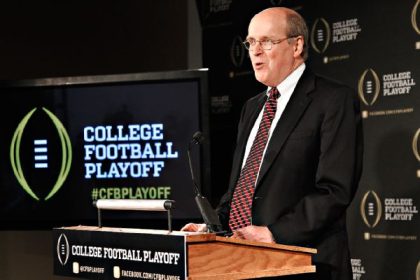
PITTSBURGH — The conversation that changed the Pittsburgh Steelers‘ season lasted less than 30 seconds.
It wasn’t even really a conversation.
Trailing 10-6 at halftime of the Week 4 game against the New York Jets, the Steelers entered the locker room feeling frustration and discontent, sentiments loudly echoed by the Acrisure Stadium crowd with boos and calls for first-round pick Kenny Pickett to play, which punctuated each empty offensive possession.
Emotions boiled over when Diontae Johnson, the team’s highest-paid receiver and top target in 2021, got into a heated argument with starting quarterback Mitch Trubisky in the locker room after another listless half where the Steelers managed six points, one third-down conversion and 121 yards in seven possessions.
Even outside the locker room, the tension and central conflict facing the organization was evident. Earlier, as the Steelers faced a 10-0 deficit in the second quarter, the CBS broadcast crew discussed when Pickett would supplant the veteran.
“It’s inevitable,” former NFL safety Adam Archuleta said on air. “The matter is timing. When is the right time? You know there’s going to be a period where you’re going to take your medicine. Do you want to take the medicine now or do you want to take the medicine later? That’s really the biggest question.”
With 58 passing yards at halftime, Mike Tomlin cracked open the proverbial prescription bottle. He measured a dose and gulped it down.
At halftime, Tomlin delivered the news to Trubisky: Pickett would start the second half.
“It was quick,” Trubisky told ESPN. “It was pretty much out of my hands. I couldn’t even ask why or what happened. He made the decision, and we went with it.
“I thought I should have had a little bit longer leash. … And then once you go to someone you draft in the first round, it’s probably not going to come back around to you right away.”
As the Steelers’ defense forced the Jets into a three-and-out to open the second half, deafening chants of “KEN-NY, KEN-NY” rained down as the Jets punted.
Seconds later, No. 8 trotted onto the field and the Pickett era officially began.
But Pittsburgh isn’t Hollywood — at least it wasn’t on Oct. 2.
The Steelers lost 24-20. Pickett threw three interceptions.
But Tomlin was playing the long game. He stuck with the rookie, going back to Trubisky as the starter only after Pickett had two concussions.
While the immediate goal was to provide a spark to a dysfunctional offense, Pickett’s baptism by fire is paying off. With Pickett, the Steelers are on the brink of a playoff berth after back-to-back game-winning drives orchestrated by the rookie to keep their once-infinitesimally small hopes at a postseason bid alive.
After a 2-6 start where each quarterback posted a 1-3 record as starter, the Steelers have since gone 6-2 thanks in large part to the rapid development and maturation of their first-round quarterback, establishing not only an outside shot at the playoffs, but perhaps even more importantly, a strong foundation to build from in 2023.
ON A GRAY, otherwise nondescript day in late January 2022, the quarterback who defined the Steelers for the better part of two decades walked into the UPMC Rooney Sports Complex with a stack of empty boxes and left hours later with words of gratitude and boxes full of memories. For all the fanfare Ben Roethlisberger generated and reveled in over his nearly two-decade career, his final exit was understated. Of course, there was the final lap around then-Heinz Field after his last home game — a win vs. the Cleveland Browns — and the hand-in-hand exit through the tunnel with his family. But when the final curtain fell on the Roethlisberger era, there wasn’t a farewell news conference, just a video posted to Twitter and a locker clean-out.
As Roethlisberger faded into the Steelers’ past, an organization built on stability moved from an era of certainty into unfamiliar territory. After 18 seasons of quarterback continuity, the Steelers met a situation similar to the one they faced after Terry Bradshaw’s retirement in 1983: a vacant starting job and no obvious heir apparent.
As soon as the NFL’s legal tampering period opened on March 14, 2022, the Steelers reached out to Trubisky and his representatives with high interest in signing the Chicago Bears‘ 2017 No. 2 overall draft pick. While the Steelers were up front with Trubisky in their pitch — he told ESPN the Steelers informed him they might draft a quarterback — he felt Pittsburgh offered a clearer path to a starting job than other teams with interest, including the New York Giants.
On March 17, Trubisky signed a two-year, $14.2 million contract, joining a room that included Mason Rudolph and Dwayne Haskins.
“Everything happened kind of quick,” Trubisky told ESPN recently. “I didn’t really have a long time to think of the decision. I wish I would’ve taken some more time and not just signed the first day of free agency. Looking back on it, just try to do some more research. But I felt like they were interested. I felt like it was a good opportunity to possibly get back on the field, but nothing’s guaranteed.”
A month and a half after he signed, Trubisky’s path to to reestablishing himself as a starting quarterback started to evaporate when the organization used its No. 20 overall pick to select Pickett, the first first-round quarterback selected by the team since Roethlisberger went No. 11 in 2004.
A franchise that prides itself on drafting and developing players, the Steelers invested years in evaluating Pickett formally and informally. In sharing a practice facility and stadium with Pitt, the Steelers had a front-row seat to Pickett’s development over five seasons as a Panther. They saw him transform from a quarterback with 38 touchdown passes in his first three seasons as a starter to throwing 42 as a fifth-year senior. He finished as Pitt’s all-time leader in a laundry list of offensive categories, including passing yards and total offense, and he capped his final season as a Heisman finalist and the ACC Player of the Year.
The 2022 quarterback class was unheralded by draft analysts, but the Steelers prioritized Pickett because they felt his extended experience as a starter and his age made him the most mature, NFL-ready player of the group.
“We circled the globe — or at least the United States — here the last several months, man, just exploring and researching,” Tomlin said in April, his excitement obvious as he grinned, sitting beside general manager Kevin Colbert. “And it’s funny, we ended up with a guy from next door.”
Even with Pickett, the Steelers treated Trubisky as the de facto starter through the offseason. Tomlin didn’t formally announce Trubisky as the Week 1 starter until Sept. 6, but players were told Trubisky was the starter until further notice beginning in OTAs.
Though the coaching staff publicly maintained there was an open quarterback competition with a methodical plan for evaluation, there wasn’t really a training camp battle between Pickett and Trubisky. Trubisky took the bulk of first-team reps in Latrobe, while Pickett mostly worked with the third string until he started taking some of Rudolph’s second-team snaps late in camp. (Haskins, who would have likely competed for a backup job, had died tragically in April.)
But Pickett gained significant momentum the moment he stepped on the Acrisure Stadium field for the first preseason game, leading a game-winning drive with 1:10 left in the fourth quarter, capped by a 24-yard touchdown strike to Tyler Vaughns delivered under pressure with 12 seconds remaining.
The crowd erupted with “KEN-NY” chants in an atmosphere that felt more playoff than preseason.
After months of anticipation, Steelers fans began to exhale, their anxiety of the unknown without a future Hall of Fame quarterback replaced by hope in a new quarterback.
PICKETT GREW UP 10 minutes from the Jersey Shore, but after playing five years of college football at Pitt, Pittsburgh claimed him as its own.
From the minute the Steelers drafted the adopted hometown kid, fans started dreaming of seeing him take the field in black and gold, a chance to rewrite history and soften the still-lingering blow of passing on Dan Marino, original Pitt quarterback legend, in 1983. Even Art Rooney II invoked Marino’s name at Pickett’s introductory news conference.
“Usually, I get to say to the individual, ‘Welcome to Pittsburgh,’ and today I get to say, ‘Welcome to this side of the building,'” Rooney said in May. “It’s a great feeling to be able to do that.
“And it’s also something for me to be able to say that we drafted somebody who broke all of Dan Marino’s records in college, which is pretty special.”
On the first day of training camp, Trubisky opened up the first team period with two straight incompletions. One fan in the crowd didn’t waste any time.
“Get Pickett in there,” he yelled.
And that was just the start.
Privately, one source with knowledge of the Steelers’ offense believed Trubisky needed to start the season 3-1 — or at least 2-2 with solid performances — to hold off Pickett.
Instead, Trubisky played conservatively in the lead-up to that critical fourth start, and went 1-2 against two AFC North opponents and the Patriots. In his lone win, the season-opening overtime victory against the Bengals, Trubisky and the offense were outgained 432-267.
As Tomlin told the team to shut out the outside noise and voiced his support for Trubisky, public pressure mounted to make a change. Entering Week 4, the Steelers led the league with 12 three-and-out drives, and the offense scored just four touchdowns.
While Trubisky came to Pittsburgh in hopes he could revitalize his career as a year-long starter with aspirations of competing for the starting job in 2023, Pickett was always the long-term plan. Trubisky was the bridge, and at halftime of Week 4, Tomlin decided to cross the bridge to Pickett waiting on the other side, a hasty decision for a usually methodical franchise, but one the coach felt necessary.
“He provided a spark in-game that is tangible, that we saw and could feel and appreciate,” Tomlin said in early October. “But I think it goes beyond that. He’s kind of provided that spark since we’ve been stepping in stadiums. It’s just a component of who he is as a player and a quarterback, the things that he does, how he communicates, his competitive spirit. I think it’s a positive catalyst for us.”
But the results weren’t immediate.
Pickett would throw eight interceptions to two touchdowns in his first five games, eliciting external scrutiny. Behind the scenes, offensive players didn’t target Pickett but continued to feel frustrated with their lack of success and stagnant offense. They were out of sync and blamed each other for errors. While some took issue with the conservative playcalling and execution, other player sources ESPN spoke to placed less blame on offensive coordinator Matt Canada and more on some players who weren’t buying into his system, who were late to player meetings and contributed to a fractured locker room with apathy and negativity.
The lack of immediate success didn’t seem to faze Pickett.
“It comes with the territory, and he knows that,” said Tony Racioppi, Pickett’s longtime quarterback coach. “He understands the scrutiny of that position in that city. Obviously you go from Panthers to Pittsburgh, in theory, it becomes even bigger, right? The Steelers are who they are. He’s wired that way. He’s wired to stay focused, not waver and not lose confidence.”
By the time the Steelers got blown out in Philadelphia to drop to 2-6 on Oct. 30, the team was at a breaking point.
With a bye the following week, the Steelers had a choice: They could unite and use this as a turning point, or they could continue letting their discontent destroy them.
They chose the former.
IF THE PITTSBURGH Steelers’ 2022 season is a coming-of-age story about a young quarterback and team finding their way, consider the bye week a fast-paced movie montage of Pickett and the team putting in the work to turn their season around, set to a power-pop song du jour.
“This is my fifth year, and I’ve never had a bye week as productive as that,” center Mason Cole said. “In my previous four years and with a couple previous employers, it was a real light work week and more of a vacation. That wasn’t necessarily the case here. … it was productive and it’s what we needed.”
They practiced. They met. They talked. They practiced some more.
And from that bye week emerged a new team, and at the center was Pickett.
Week by week, the Steelers’ offense coalesced around him. Improvements to the offensive line led to a surge in the run game, complementing Pickett as his connection strengthened with targets Pat Freiermuth, Diontae Johnson and George Pickens. After throwing eight picks in his first five games, Pickett went on a five-game interception-less streak, attempting more than 128 passes without an interception to set a Steelers’ rookie record.
“I’m continuing to grow,” Pickett said recently. “It’s not going to happen overnight. I like the way that I’m trending. I like the way that I’m improving and seeing things on field, taking what I’m seeing on tape and bringing it to the field and playing with a little bit more anticipation than I was earlier in the season. But I think it’s definitely a long journey. I don’t think you’re done getting better till you hang them up.”
As Pickett has evolved on the field, he has also evolved as a leader. The Steelers always said Pickett was a natural leader, and while he has embraced that role, he also spent his first months absorbing and adjusting to the NFL.
He got louder once he became a starter, and with more game experience and a bye week of intensive work, Pickett found his voice and took flight in the second half of the season.
In addition to studying in a makeshift study cubby in the corner of the team meeting room, Pickett advocated for more meetings with the offense and was a driving force in having more collaborative meetings and film studies between position groups.
“Sometimes you’ve got to come in and be vocal, got to interject yourself,” cornerback Cam Sutton said. “And sometimes, you gotta be there, fly on the wall. Sometimes you’ve got to maneuver a room and understand people, understand situations. … Once he got moved into the [starting] role, he’s been nothing short of that leader for us, that leader for the offense, having those guys together.”
Trubisky played a part, too. No longer the starter, he transitioned to a support role for Pickett — on and off the field. Trubisky joined the Bears, a team that already had a highly paid veteran on the roster in Mike Glennon, and quickly supplanted Glennon. Now, he faced a full-circle moment as he became another set of eyes and brain to help the rookie.
Trubisky retained his captaincy, one voted on by the team, and he took that role seriously.
“The fact that they voted me captain means I gotta come in here, put my hand in the pile and lead these guys in any way I can, even if it’s not on the field,” Trubisky told ESPN.
He also took over for Pickett against the Ravens in Week 14 following Pickett’s second concussion. While he was more aggressive in that game than he was as a starter, he threw three interceptions and the Steelers lost 16-14. A week later, he started for Pickett against the Panthers and turned in an efficient performance bolstered by a complementary run game in a 24-16 win.
“I feel like I can continue to find ways to improve my game and hopefully I’ll get an opportunity, whether it be here next year or somewhere else in the future,” Trubisky said. “When I get the opportunity, I can go out there and play better. It’s been an interesting process, and my role is different than I expected. This year wasn’t what I expected, but I’m just trying to finish strong and be the best team player I can be.”
CALL IT FORESHADOWING or call it a Yinzer fairytale, but four months after his preseason game-winning drive, Pickett orchestrated two more in Weeks 16 and 17 against the Las Vegas Raiders and at the Baltimore Ravens to keep the Steelers’ playoff hopes alive.
In throwing those touchdowns passes, one to rookie Pickens and the other to Najee Harris, Pickett became the first rookie in NFL history to throw a game-winning touchdown pass in the final minute of back-to-back games.
“We can win with him, and he’s going to show up in big moments,” Freiermuth said after the win over the Ravens. “We never questioned that, but seeing him delivering those big moments and, and the guys stepping up and especially the line with the pass pro and receivers making plays, you have all the confidence in the world.”
In the biggest moments, Pickett showed a winning combination of fearlessness and poise — exactly as the Steelers anticipated when they drafted him.
“I imagine he was born with it,” Tomlin said of Pickett’s moxie after the Raiders game. “I know that it’s not the first time I’ve seen it. I know it’s not the first time that people from Western PA have seen it. We’ve seen him do it next door. I think that’s why we have such a great deal of comfort in his intangible quality and from a draft-evaluation perspective. We were in close proximity to it. And when you’re in close proximity to it, it becomes less intangible. You can almost feel it. It is real. I don’t think any of us are surprised by it.”
A week later, Tomlin locked eyes with Pickett as he came off the field following the game-winning touchdown against the Ravens. Matching the intensity Pickett just showed on the field, Tomlin gave his quarterback the ultimate stamp of approval as he yelled, ‘Kenny F—ing Pickett.'”
“It’s a new start, a new era, a new transition,” Sutton said. “I’m looking for him to be here and doing this for a long time.”










